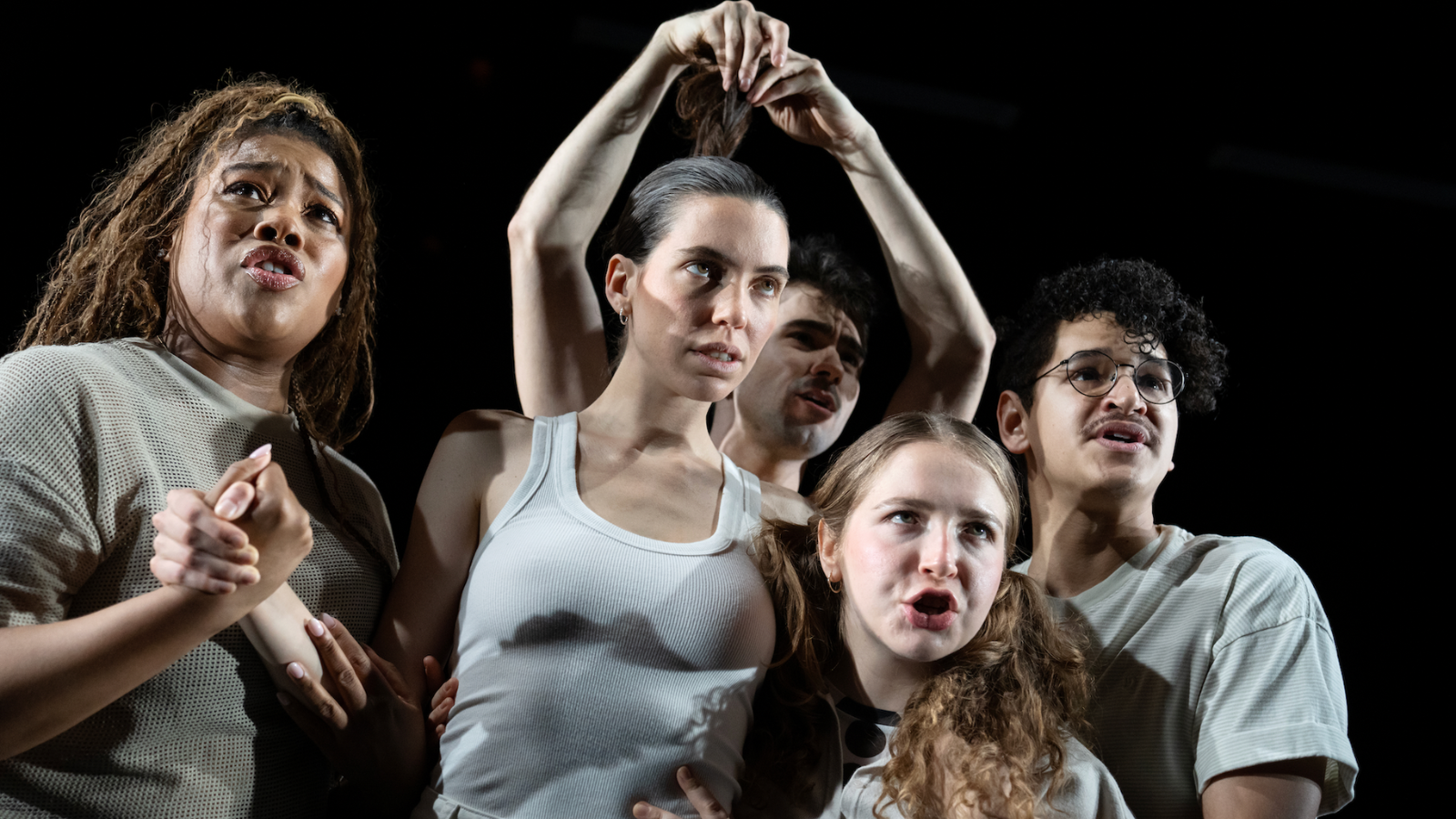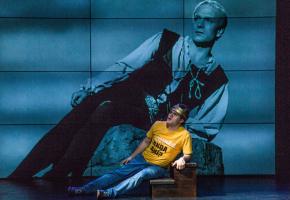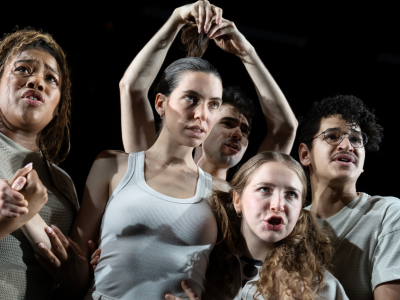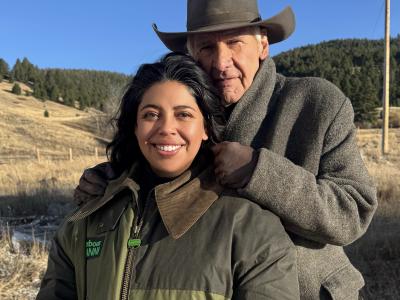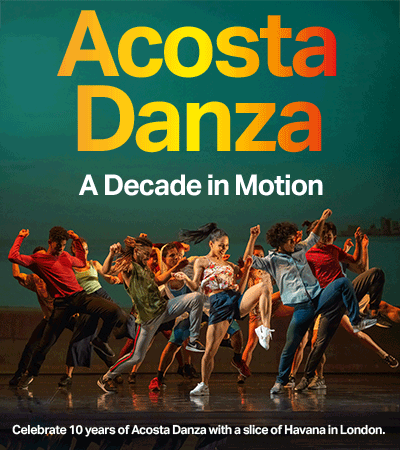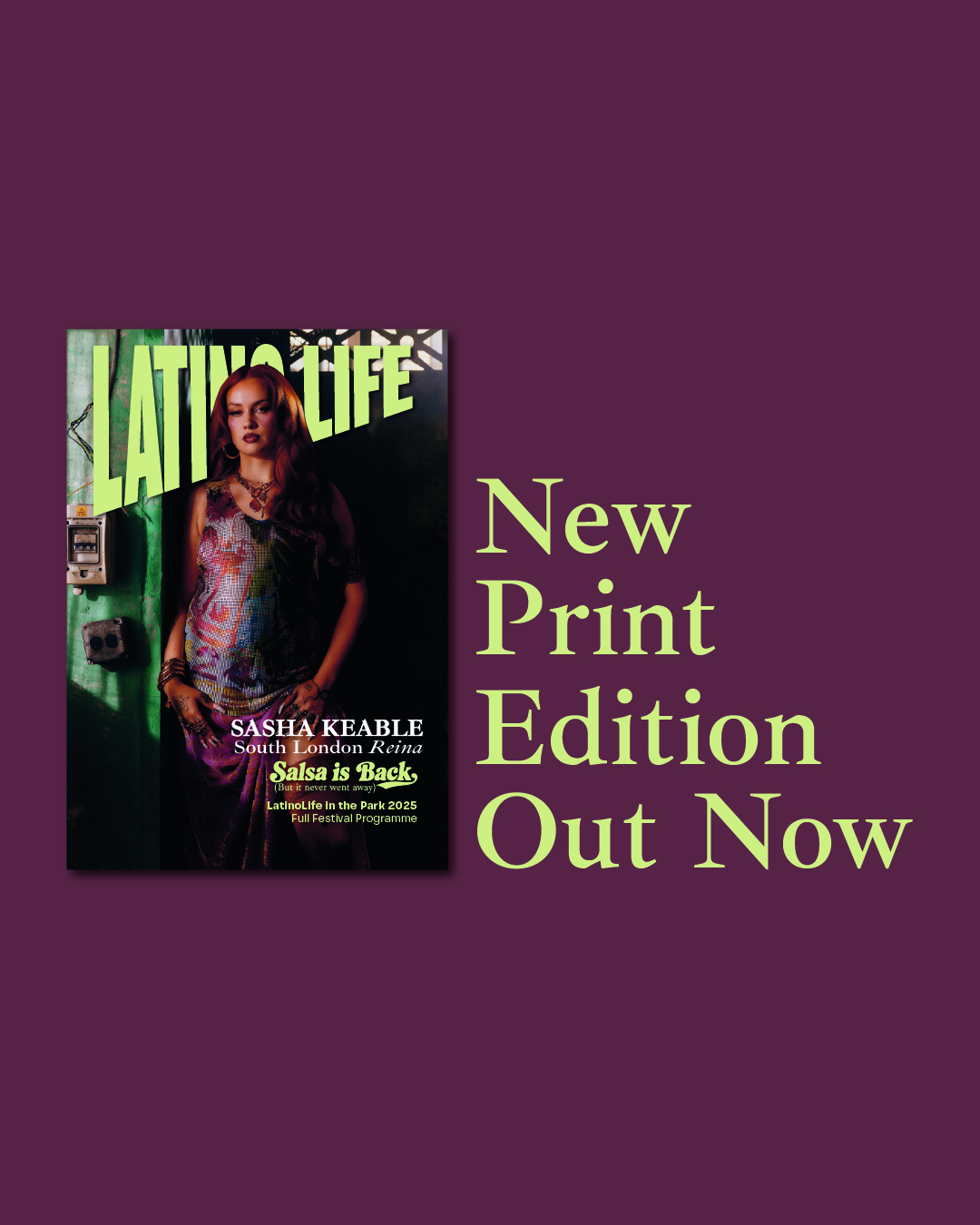“Normal can mean many different things to many different people.”
The King’s Head Theatre us an Off-West End Theatre in Islington that has become the longest running pub theatre in London. Having started out in the back room of the King’s Head Pub on Upper Street, it finally moved to its current new home in January 2024. Now known as the new King’s head Theatre it began by hosting the Exhibitionists (written by Olivier- Award writer Sean McKenna).
Now, on September 3rd, INVASIVE SPECIES opens on this renowned stage. It is written by Argentine creative Maria Novi, who also stars, and directed by Michael Breslin, the Pulitzer finalist and Obie winning writer, director and performer.
Maia Novi went from Argentina to New York to study drama at the Yale School of Drama. Her experiences as the first ever Argentine student on the course and the cultural pressures led to her seeking help from a psychiatrist.
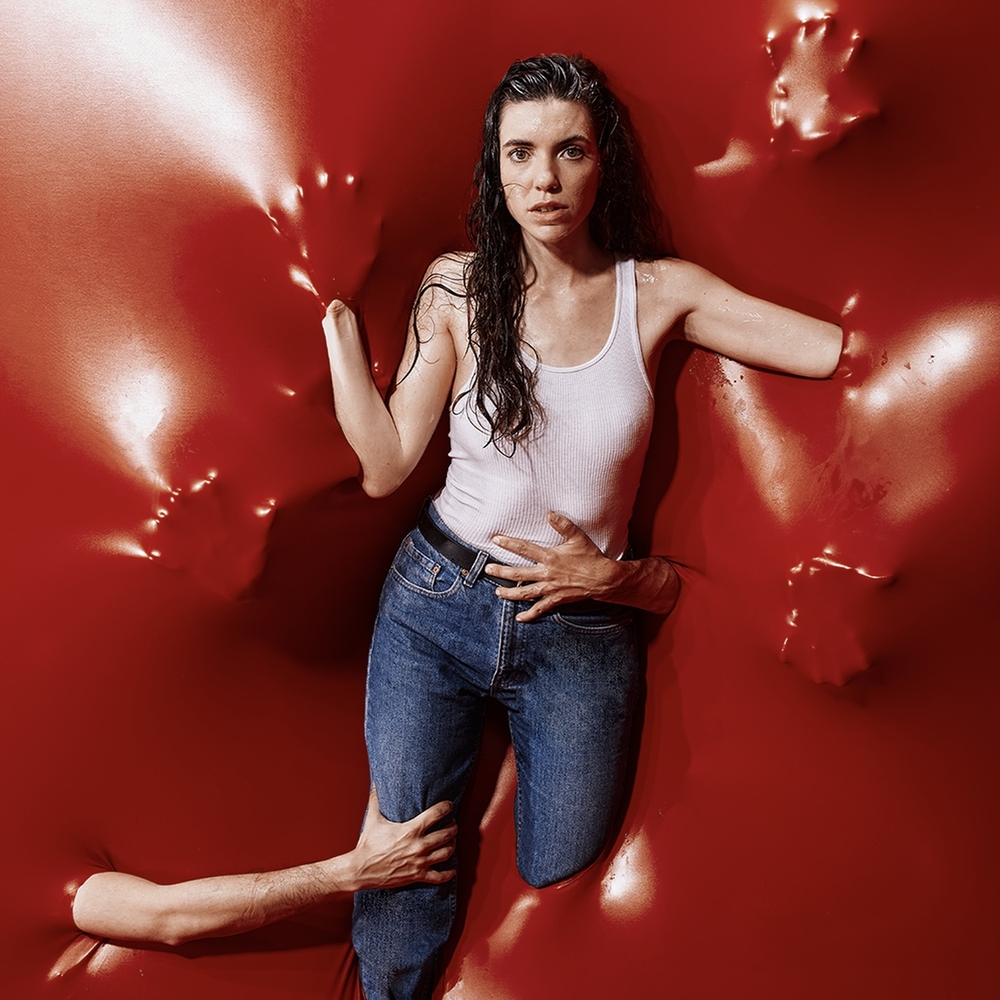
This move turned her life upside down and her subsequent experiences after being involuntarily admitted to the Yale youth psychiatric hospital in New Haven Connecticut, became rich pickings (thanks to the journal she kept throughout) for her to create this dark comedy with bizarre undertones. As they say, you could not have made it up! This play reflects influences of her Argentine background and theatrical groups like De La Guarda. Using her love of humour, she blends all this together with her strange experiences, creating this, almost, one-woman show.
The synopsis is that of an international student who starts suffering from severe insomnia while trying to cope with the pressures of the training programme at Yale. It starts as an identity crisis: “You don’t look … Argentine!” and progresses to the shock of waking up in a teen psychiatric ward and the ensuing surrealistic experiences she had there.
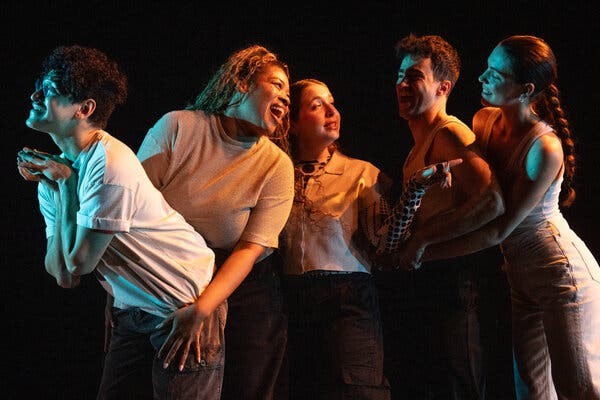
Sam González, Alexandra Maurice, Raffi Donatich, Julia Sánchez and Maia Novi
Maia sparkles from every pore. She is interesting and interested, curious, inventive, and bubbling with humour and creativity, yet this was not enough to spare her from the surrealistic, Kafkaesque experiences she experienced when she decided to consult a psychiatrist for insomnia.
Maia Novi started out at university in Buenos Aires: -
“In Argentina, I did my first Uni course. I was really involved with philosophy. But at the end of the first year into my Philosophy degree, I had an accident in Costa Rica. I fell from a 20-metre waterfall, dislocating my fourth cervical vertebra and I was bedridden for a year. But the only thing I was thinking of, you know…was acting classes. Something I was doing on the side which I enjoyed a lot, and my first worry that year, was: would I never be able to act again because my right leg wasn’t responding properly? So, I stayed in bed reading a lot of plays non-stop.
I became really obsessed with classical texts, I read all of Shakespeare and started looking up drama programmes in the world and [I tried to find] the best ones. It was a motivational way to keep me getting better and rehabilitating my body… After a year, when I was finally able to walk again, I decided to go to London to do a summer programme training at Guildhall, Music and Drama. While I was there, I realized I wanted to do this for 3 years and get into Drama school. It is really hard to get in, so you have to really prepare.
I prepared obsessively for a whole year and my Buenos Aires studies in Philosophy were really useful to me. Also, as I come from Argentina where we have got used to doing theatre with little, improvising with what we have. I felt that working towards drama school over a year was the best challenge in the world, and I had gotten used to overcoming so many obstacles in the theatre world with so much delight – [aware that] out of 3000 people only 16-sometimes 20 get in! It felt totally doable so I applied to Yale School of Drama as well as other British schools and Yale was the first school to accept me. That is how I started.”
So, it all began due to a tragic accident, and then, it was followed by another situation that was foisted on Maia, over which she had no control: Covid 19. Suddenly the world turned upside down, everyone was anxious and feeling trapped, the borders with Argentina were closed and those from abroad were not allowed to return to campus.
“Yale gave us a final fourth year at the school. In the fourth-year, students have this showcase when they travel to LA and present themselves to the industry and try to find a manager or an agent and it is really important. The whole thing was that if I were to be able to succeed in showbusiness I would have to get an agent and therefore book a job and get a work visa, so as to not get kicked out of the country. Especially as I had done so much work!
THEY WERE SAYING “Hey you don’t look Latina enough, and you have an accent. You need to sound American or you won’t be able to find an agent, because they won’t know what to do with you because your looks don’t match the way you speak! … It was almost like I had mouth contamination where my consonants and vowels were not sharp enough. I became obsessed with trying to sound American non-stop, practising and practising and doing dialect exercises and the showcase was coming up and I was having trouble sleeping.”
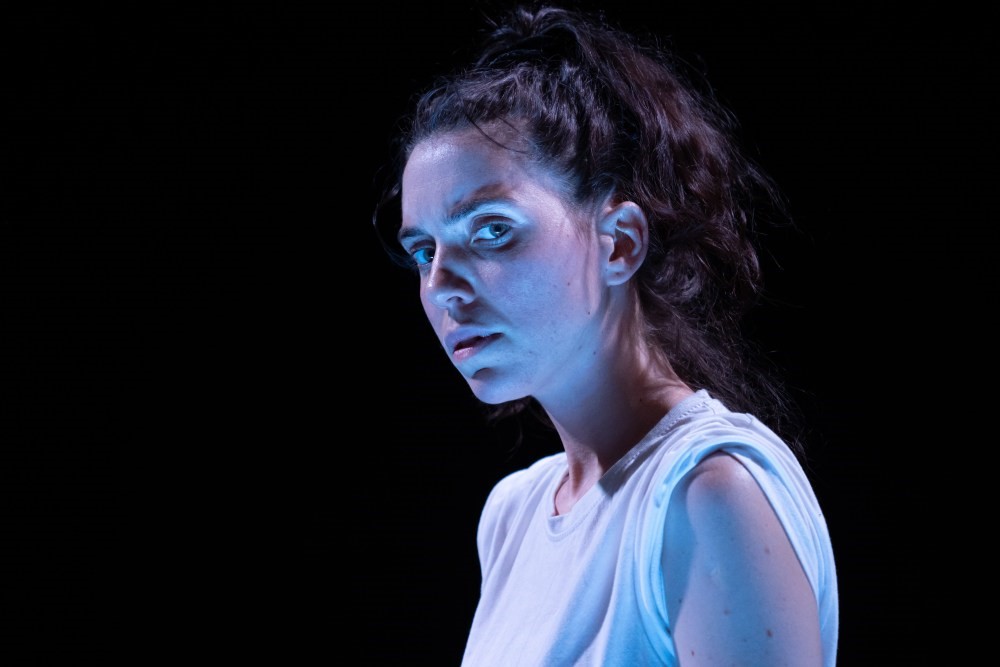
Maia Novi
Yale Health is there for students, so Maia went to request a prescription for a sleeping pill to help her through. The psychiatrist who saw her started to ask her to describe her insomnia: -
“It’s really hard to explain what is going on in your head because it is so complex and abstract. I described it as my inner monologue going really fast at night. I think that then doctor interpreted that as ‘hearing voices.’ He was saying: “Is it telling you to do things?” I said NO, it’s my own voice, but I started stuttering and getting anxious and the more anxious I got the more I realized he was looking me as if there was something really wrong with me.
By the time I tried to leave, the questions got longer and longer and I thought, you know what? This is not going to work out, I am just going to go now, I don’t think he understands me. He [then said]. I am afraid you can’t leave, you are under our responsibility, but don’t worry, we will give you a sleeping pill and if it puts you to sleep, you will be able to go home tomorrow with a prescription.
Waking up incarcerated in the youth Psychiatric hospital in New Haven was the last thing she expected!
“I do not want to use the term crazy, because that stigmatizes them and I don’t think that is [right] because, in a way, the world around me in school and even the psychiatrist who had put me in there, was to me, crazier than the children lost inside that psych ward.
So, I started to write daily entries non- stop. I was reading Beryl Churchill, which was the only book that they let me keep, and [writing] all my diary entries. Once I got discharged, I decided to assemble them, honestly as form of therapy of what had happened, but it ended up being a really good play… connected by the theme: the question of WHAT IS IT TO BE NORMAL?”
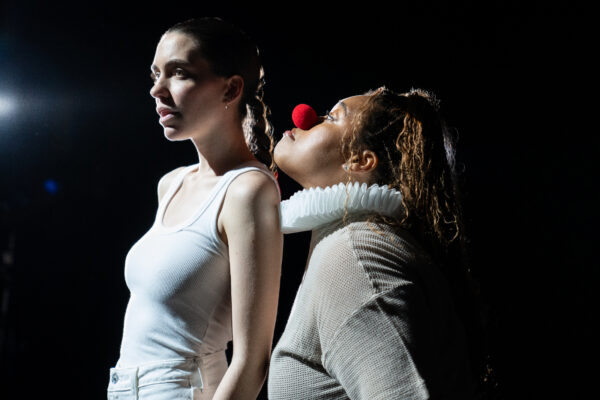
Maia Novi and Alexandra Maurice
This became the theme for Maia Novi in INVASIVE SPECIES.
It was emphasized by one the young girls in the Psych ward, Aiquila (who features in the play) who insisted: “If you want to get out of here, act normal, pretend. Tell them that this place saved your life! That you love it! Stop resisting!” Thanks to this wise advice, she eventually got out and looking over her diary entries, she realized there was a story there to be told.
She approached the La Mama experimental club theatre: -
“That is when Michael Breslin, the director, who is an amazing dramaturg, as well as Amauta Marston Firmino, who is another dramaturg [both of whom] I met in Yale, who helped me put it together. One thing I took from YALE were my collaborators! They helped me tighten it up. From this gigantic marble stone, they helped me sculpt it, and people were laughing. I didn’t really know how funny it was until people started laughing.”
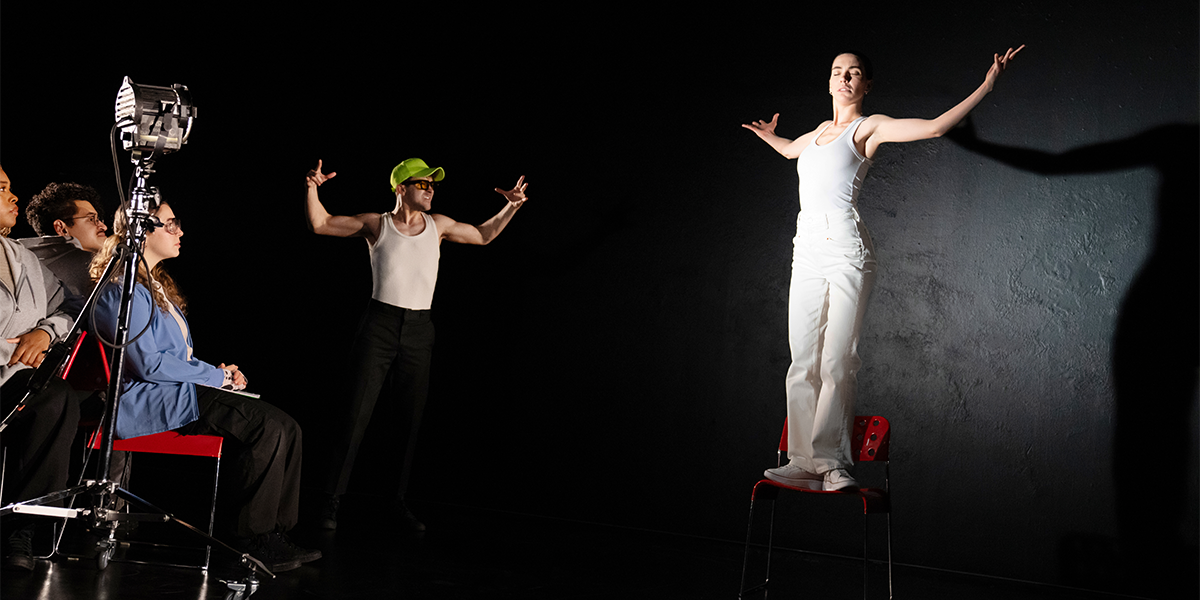
From the start, Maia wanted to maintain the feeling of authenticity, avoiding the emphasis on special effects and spectacle, trying to find the heartbeat of something that has a world of its own, and is different, a universe that relied on the poetry of the show rather than the artifice.
“I think we are in a world-wide mental health pandemic where mental health has been declining exponentially. Honestly, I think that Covid was a part of it and it was when mine started to decline. A lot of the things about mental health in the play resonated with people and in particular the Latinos, young international students and queer people.”
She was moved by the number of Latinos who approached her to say they identified with the play’s themes. Being such an intense and personal play, Maia admits she can get quite emotional, and is particularly grateful to the actors who give so much of themselves to the process, especially as the play demands quick physical and athletic transitions.
“It is cathartic being on stage with the wonderful job that Michael has done, making sure the play works. Obviously, there are things that are heavy but he always makes sure that the play feels fun and light- so that these children are a driving forces of hope and joy, with a common thread of deep love, which I think makes the experience so much more cathartic, than traumatizing, in feeling. A way to let it all out. It’s like purging”
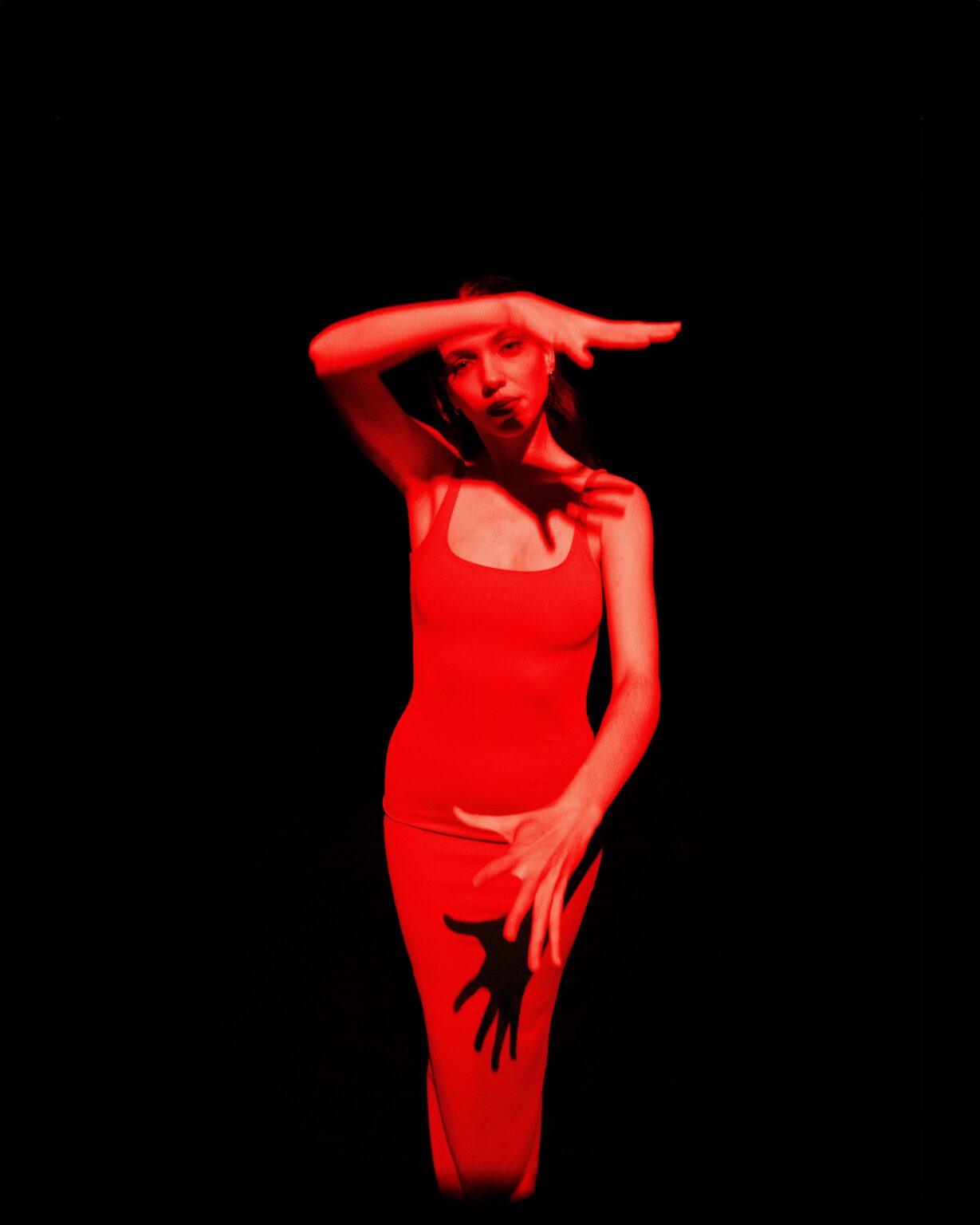
There is a revenge twist to the tale in that Maia points out how, in this current, rapid machine- like Capitalist society there is little time for emotions or mental health considerations: -
“There is no time free to delve into how you feel or what your wound is like. We just need to fix this, so that you can continue to be a part of the efficiency of the machine you are in. That is how it feels sometimes… and you have to work, otherwise you will slow down the machine.
Which is why even the play feels like a machine. It’s similar to how manic the whole situation felt: the play moves like thunder- It’s very honest to the experience of having literally been in and out of the psych wards… We need more stories where we [Latinos and Latin Americans] get to be funny; we get to be weird and freaky and [find a way] to break out of the box that we have been put in for a very long time… humour is the most healing medicine we have.”
I had some really beautiful theatrical early teenage years [at home and in my first acting classes in Buenos Aires] which were majestic. My mother is funny! Humour has to be unafraid to be loud and it is a very unapologetic society... we are pushing forward with so much passion that there is no way to stop. So, I think that what I learned from Argentina is to be passionate with my craft.”
INVASIVE SPECIESWILL OPEN ON SEPT 3RD
AT THE NEW KING’S THEATRE, ON UPPER STREET IN ISLINGTON
- Cast: Lead Maia Novi
Performer 2 | Kalifa Taylor
Performer 3 | Harrison Osterfield
Performer 4 | Max Percy
Performer 5 | Ella Blackburn - Written by Maia Novi / Directed by Michael Breslin / Dramaturg | Amauta M. Firmino
Casting Director | Sarah-Jane Price UK Set Designer & Associate Costume Supervisor | Damien Stanton UK Associate Lighting Designer | Ben Jacobs
UK Associate Sound Designer | Dominic Brennan Company Stage Manager | Alexandra Kataigida Production Manager | Carrie Croft General Manager & Executive Producer | James Quaife


